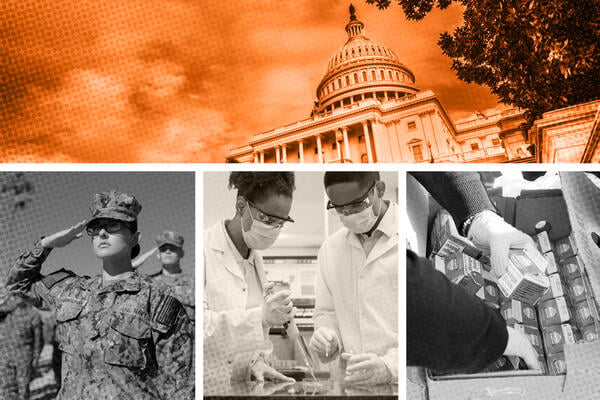
Higher Ed Feels “Cumulative Exhaustion” of Longest Shutdown
As the current government shutdown claims the mantle of longest in American history, uncertainty is ratcheting up for faculty, students and their institutions trying to budget for the weeks, months and years ahead.
Five weeks in, the federal government’s closure has disrupted nearly all aspects of campus life, including research, basic needs support and military-affiliated students’ access to tuition assistance.
On Monday, North Carolina State University joined a growing list of institutions that have limited spending and faced research disruptions as a result of the government’s inaction. The university said the ongoing shutdown has delayed payment for federally funded research activities worth more than $25 million per month, according to an internal memo reviewed by Inside Higher Ed.
“To ensure the long-term continuity of our research, we must take steps to preserve the university’s available resources that support our vital research projects,” administrators wrote in the memo to deans, directors and department heads. “Effective immediately, we are directing all colleges and units to limit all non-payroll expenses on federal contract, grant or other award mechanisms.”
While federal payments remain suspended, federally funded researchers at NC State won’t be able to spend money on new hires, nonessential travel, consulting services, and supplies and materials among other things.
Meanwhile, it’s still not clear when the government might reopen.
Health Care in Question
On Tuesday, Senate Republicans and Democrats failed for the 14th time in 36 days to negotiate an end to the shutdown. Those negotiations have centered on Democrats’ demands—and Republicans’ refusal—to extend enhanced tax credits for health insurance premiums through the Affordable Care Act, which are set to expire at the end of the year.
Without those subsidies, the cost of health insurance is expected to increase for millions of Americans, including thousands of adjunct professors who don’t qualify for health insurance through their institutions and have only a small margin of discretionary income.
“In this stalemate, there are no options I have to meaningfully plan for what the next month-and-a-half looks like going into the new year. There’s just no way to get ahead,” said Thomas Moomjy, a lecturer in American Studies at Rutgers University at New Brunswick who buys health insurance through New Jersey’s health care exchange. “I also have to account for the fact that the cost of everything else—electricity, car insurance—is going up, too.”
But the results of Tuesday’s elections, which saw wins for Democrats in numerous state and local races, may further complicate the path toward reopening the government.
President Donald Trump blamed Republican losses on the shutdown, emboldening Democrats to double down on their fight to extend the health insurance subsidies. “Donald Trump clearly is feeling pressure to bring this shutdown to an end,” Senate majority leader Chuck Schumer said on the Senate floor Thursday. “Well, I have good news for the president: Meet with Democrats, reopen the government.” So far, Trump has refused such a meeting, insisting that the government reopen prior to any negotiations.
None of this week’s developments offer hope to college students, or some faculty and staff, who aren’t sure if they’ll be able to afford basic necessities as the shutdown continues.
“At this point, I just want the government to reopen,” Moomjy said. “I’m not sure that will fix the ACA stuff, but we’re reaching a point of cumulative exhaustion. If this pushes on much further without [Congress] offering something to the American people to say, ‘We at least hear you and can help to lower it in some way,’ then it feels like they’re fighting each other with slogans. The people that are getting hurt are us down on the ground.”
Basic Needs Insecurity
Vulnerable Americans also include more than 1 million college students who rely on the federal Supplemental Nutrition Assistance Program (SNAP) to buy food, and who didn’t receive those subsidies as planned on the first of the month.
On Monday, in response to court orders, Trump agreed to fund half of the program during the shutdown. After Tuesday’s election, he increased it to 65 percent of full funding, though experts say most SNAP recipients will get far less than that once they receive their already-late benefits. Despite those partial concessions, many colleges—which are already grappling with tight budgets as a result of Trump’s ongoing assault on higher education this year—are still scrambling to help their students cope with the partial loss to benefits this month.
On Thursday, a federal judge ordered the Trump administration to fully fund SNAP.
Concerns about paying for food, health care and housing during the shutdown are top of mind for students and families, according to an informal survey conducted by the American Council on Education (ACE). And those worries extend beyond students and parents who work in the public sector or receive government assistance directly; 30 percent said their private sector jobs are suffering because of the shutdown.
“One [parent of a college student] said they work for a private contractor whose budgets partially depend on federal funding. The shutdown has reduced and delayed funding which affects their ability to provide services, earn their regular income and meet their basic needs,” Emmanual A. Guillory, senior director of government relations for ACE, told Inside Higher Ed. “Other [students and parents] said their inability to pay bills is causing strain on their mental health.”
Disruptions for Military Students
The shutdown is also directly threatening some students’ ability to stay enrolled at all.
While civilian students can at least access federal financial aid to cover their tuition during the shutdown, student-veterans and their dependents who rely on military benefits—including Military Tuition Assistance (TA) and the My Career Advancement Account (MyCAA) tuition assistance program for military spouses—to pay for their education are dealing with disruptions and delays to those payments.
Some institutions, including Austin Peay State University in Tennessee and the online learning behemoth Southern New Hampshire University, are helping military-affiliated students stay on track during the shutdown by allowing them to register without payments or tuition assistance in place.
According to an SNHU spokesperson, 2,840 undergraduates who receive military tuition assistance were impacted by the shutdown when they started a new term last week. If the government is still closed by the time the next graduate term starts next week, an additional 440 military-affiliated students who have already registered for classes will need waivers from SNHU.
Disruptions to GI Bill payments—caused by a system failure at the Department of Veterans Affairs and compounded by the shutdown—may also put up to 75,000 survivors and dependents of deceased military veterans at “serious” risk of losing access to post-secondary education subsidies, according to the Tragedy Assistance Program for Survivors.
Meanwhile, Senate Democrats and Republicans remain at an impasse on resuming government operations.
Guillory of ACE, who was at the Capitol this week for discussions about implementing the One Big Beautiful Bill Act, said that from what he’s observed “it’s highly unlikely” that a deal to reopen the government will be reached by Friday.
But whenever it does finally happen, higher education institutions and their students and faculty who have been affected by the shutdown won’t just be able to pick up where they left off.
“There’s going to be a backlog of things that needs to get done,” Guillory said. “This is pushing everything back and leaving institutions in a place of uncertainty.”
Source link


